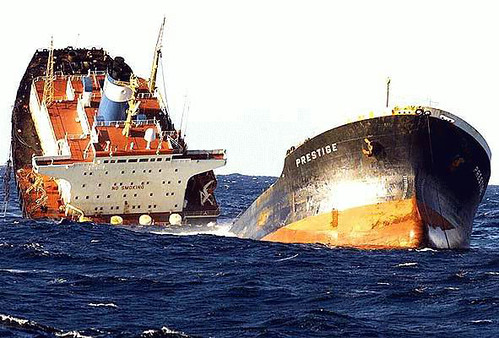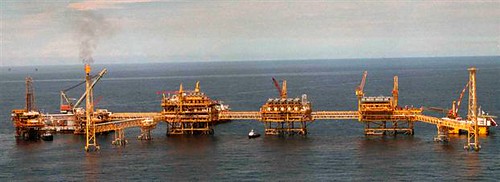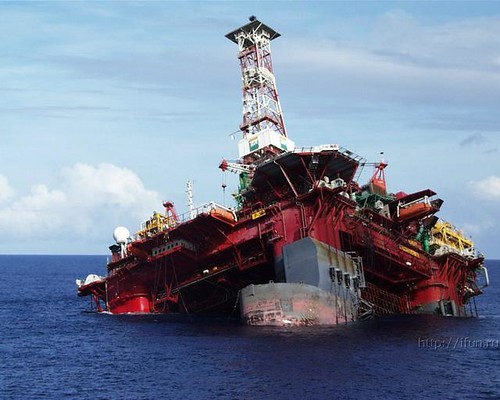Hurricane force vs. a few brave ships
The 2007 Hurricane Season is on, with the onslaught of the monster hurricane "Dean" - a catastrophic category five storm. I'm sure we'll all see the tv coverage of what it's like somewhere on-shore, but here are some hair-raising pictures of ships in heavy seas, including a wrecked oil rig platform (the likes of which they are evacuating right now, away from the hurricane's path)

(image credit: Expeditioner in heavy seas aad.gov.au)


(image credit: navy.forces.gc.ca)

(image credit: Seafish.org)
HMCS "Halifax" encounters some heavy seas on the Grand Banks off the coast of Newfoundland during a fisheries patrol in January 2007":


(images credit: DND, navy.forces.gc.ca)


(images credit: J. J. Pronk, tv-antenna)
A stunning photo of a helicopter rescue of the "Braer" ship crew, in trouble near Sumburgh Head:

(image credit: Seafish.org)
Navy aircraft carriers in trouble
During the WWII and until 1950, most Navy aircraft carriers had a certain blunt bow design, that did not stand well against the onslaught of powerful waves.

(image credit: Pentagon)
In January 1959 US Aircraft Carrier "Valley Forge" encountered heavy seas that "broke over her forward flight deck, tearing away part of its port side. This was a dramatic example of the vulnerabilities of the "open bow" design typical of World War II aircraft carrier design, a problem solved by the enclosed "hurricane bow" fitted to carriers newly built or modernized during the mid-1950s and later." (source). The survey of the storm damage to the ship caused positive changes in design, but not until a few other carriers suffered the same fate:
"Valley Forge" before the damage:



Battling heavy seas:

The damage after the storm: (imagine the force with which the waves slammed the ship!)


(images credit: US Navy)
On 5 June 1945 the carrier "Bennington" was damaged by a typhoon off Okinawa:


(image credit: uss-bennington.org)
Aircraft carrier "Hornet" also suffered typhoon damage:

(image credit: cco.caltech.edu)
USS "Essex" on January 1960:

USS "John F. Kennedy", one of the more modern carriers, is shown here in heavy seas:

(image credit: chinfo.navy.mil)
Tankers are a BIG wave target:

"Erika" - a massive oil tanker succumbed to the power of the storm in the waters of Northern Gascony. A little rescue ship "The Abeille Flandre" have been able to secure the tanker even after it split in two, keeping the stern afloat and preventing the ship to run aground, which could've caused a huge oil spill.

(image credit: bourbon-online.com)
Nothing can help this tanker:
("Levoli Sun", in the English Channel, north of the Isle of Batz)

(image credit: bourbon-online.com)
Big cruise ships are tossed around in the heavy seas like a child's toy:

"Voyager" - very modern ocean liner, in the middle of Mediterranian swells:
Here is another big ship: New Zealand' ferry "The Aramoana" in the Cook Strait - one of the roughest stretches of water in the world:

(image credit: teara.govt.nz)
The wreck of oil tanker "Prestige" off the coast of Spain (more info) -

(image credit: Archive Photo EFE)
Evacuate! Evacuate!
When big offshore oil rig is damaged, it's not a pretty sight; it is rather a testimony to the power of hurricane's wave surge, which can crumble the structure like a bunch of sticks:
This is the current facility off the shores of Mexico (14,000 workers evacuated, production completely shut down, oil rigs abandoned) "Dean bears down on oil fields" - article.

Here is what it might look like after Dean passes over:
"NEW ORLEANS, La. (July 12, 2005)--Thunder Horse, a semi-submersible platform owned by BP, was found listing after the crew returned. The rig was evacuated for Hurricane Dennis. USCG photos by PA3 Robert M. Reed"





(image credit: Botinok)
CONTINUE TO NEXT PART
READ THE FIRST PART HERE







